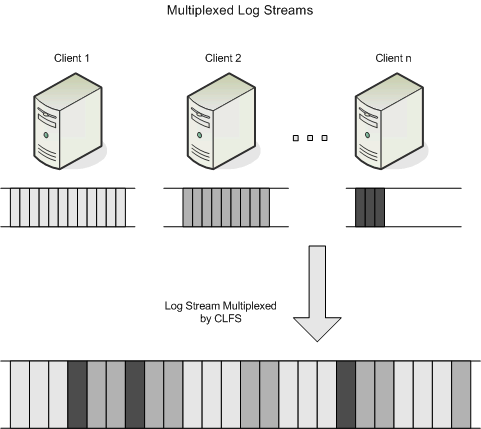Note
Access to this page requires authorization. You can try signing in or changing directories.
Access to this page requires authorization. You can try changing directories.
Common Log File System (CLFS) uses the following abstractions to implement logging:
- A record is a unit of data that a client appends. Records in the active region of a log are never overwritten. Records cannot be updated or overwritten.
- A log stream is a unique sequence of client records. A dedicated log has only one, unnamed, stream. A multiplexed log has one or more named streams.
- A physical log is a physical set of files and attributes that store one or many log streams. These files are managed through a master file with a .blf file name extension, one for each physical log. There may be one or more additional application-specific files created by CLFS and referenced through the .blf file.
- A marshaling area is a buffer that a client creates to gather log records for a log stream.
You can specify that a log hold only one stream or multiple streams. For one stream, CLFS optimizes access patterns for a dedicated log. For multiple streams, CLFS optimizes access patterns for a multiplexed log.
Dedicated and Multiplexed Logs
A log is dedicated if it stores only one log stream, or multiplexed if it stores one or more log streams. However, after a log is created it cannot be converted from one type to the other.
A multiplexed log is a physical log that is shared by multiple streams. A multiplex log represents a contractual agreement between two applications or subsystems that share the same log. Each stream in a multiplexed log appears to its client owner as if it were stored in a dedicated log.

At any one time, only one marshaling area per stream should write to the log. If you have more than one entity writing to a stream at the same time, the log can be corrupted just like a file can be corrupted.
[!Important]
Security is on a per-log basis. All log streams have the same security as the physical log.
The primary advantage of using a multiplexed log is that system I/O costs are shared across multiple streams so system performance may be better than if several dedicated logs are used on a single disk. Records and log blocks in multiplexed logs are usually written to the same disk cylinder, which minimizes seeks and reduces I/O latency.